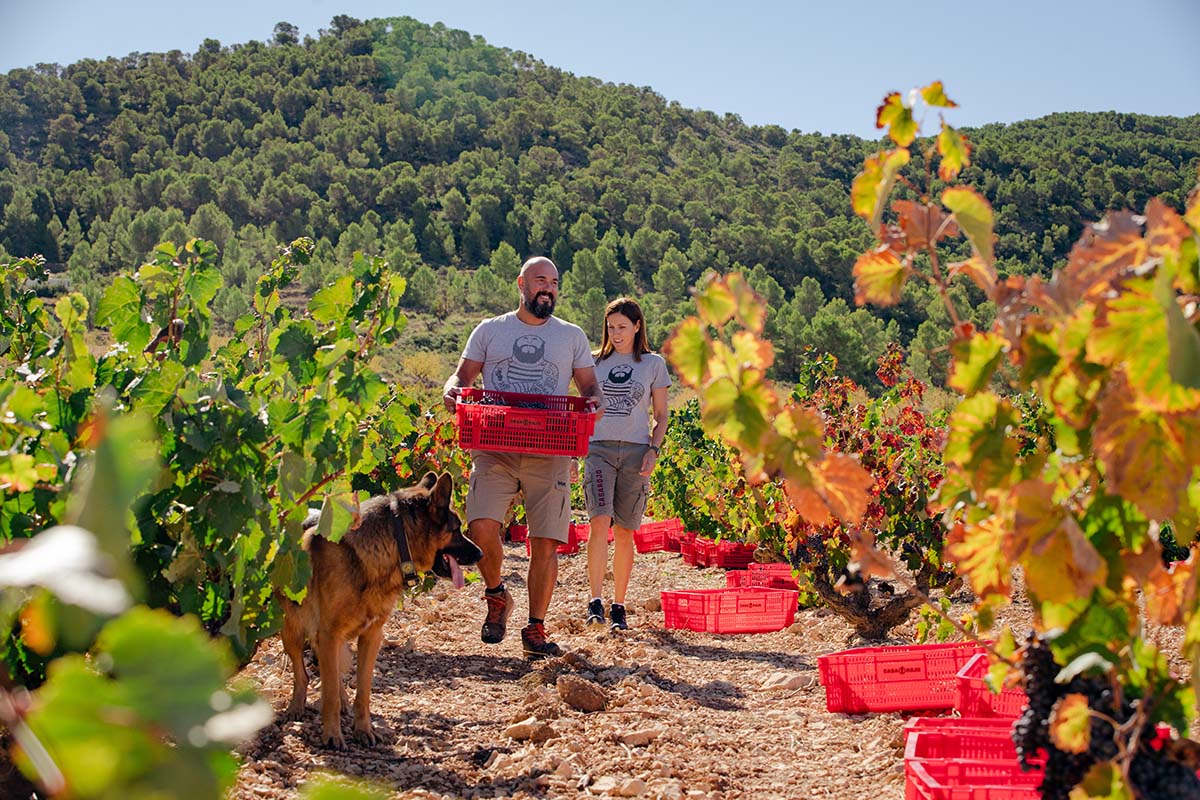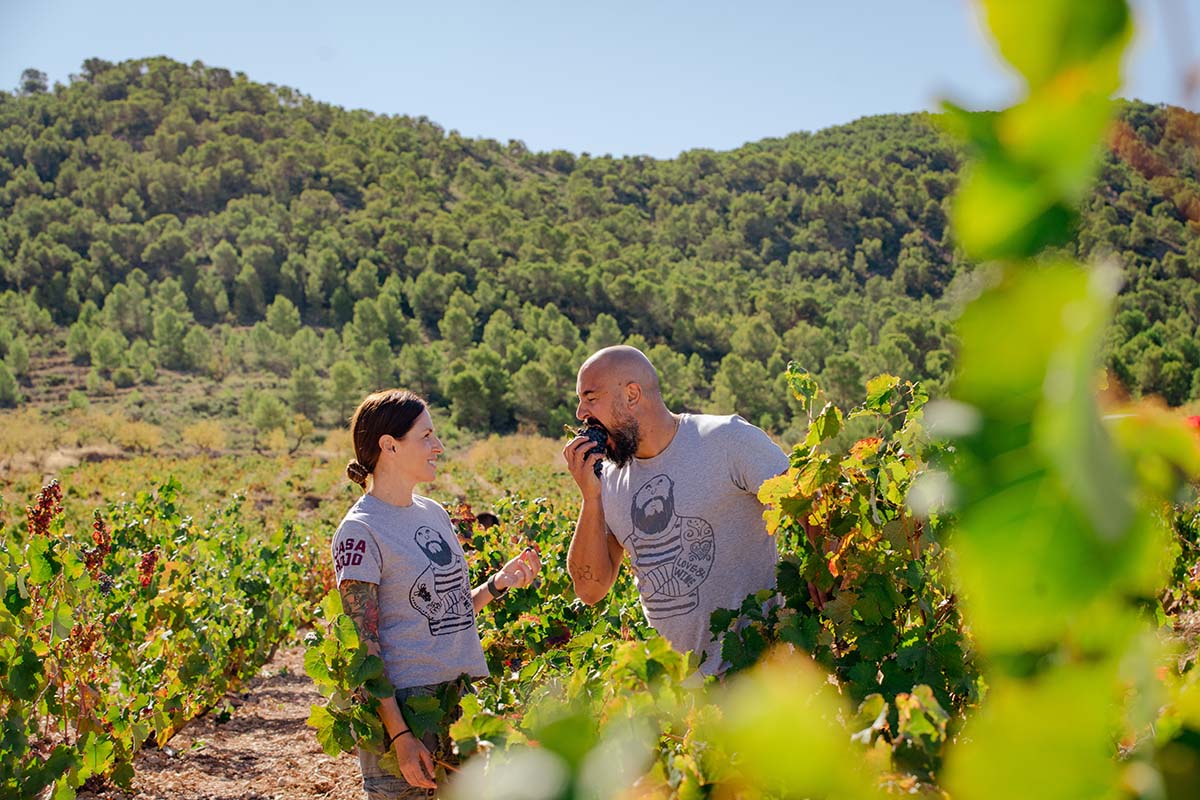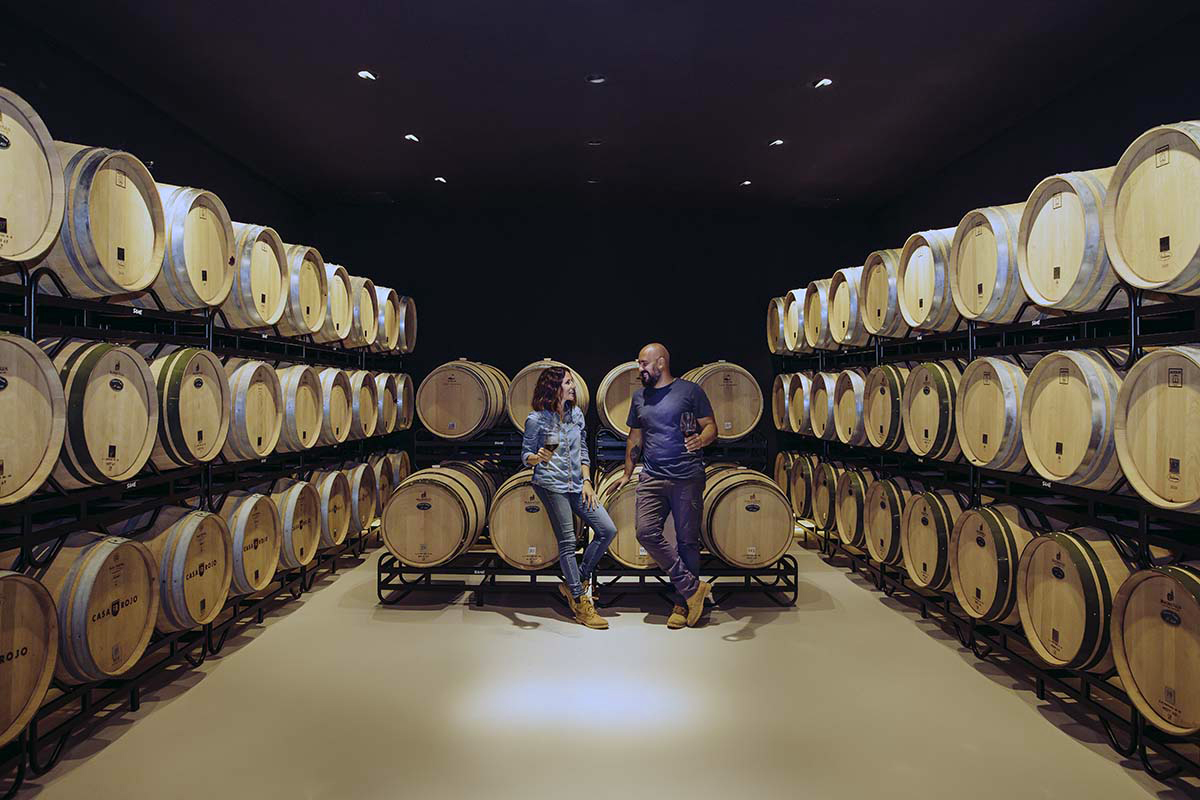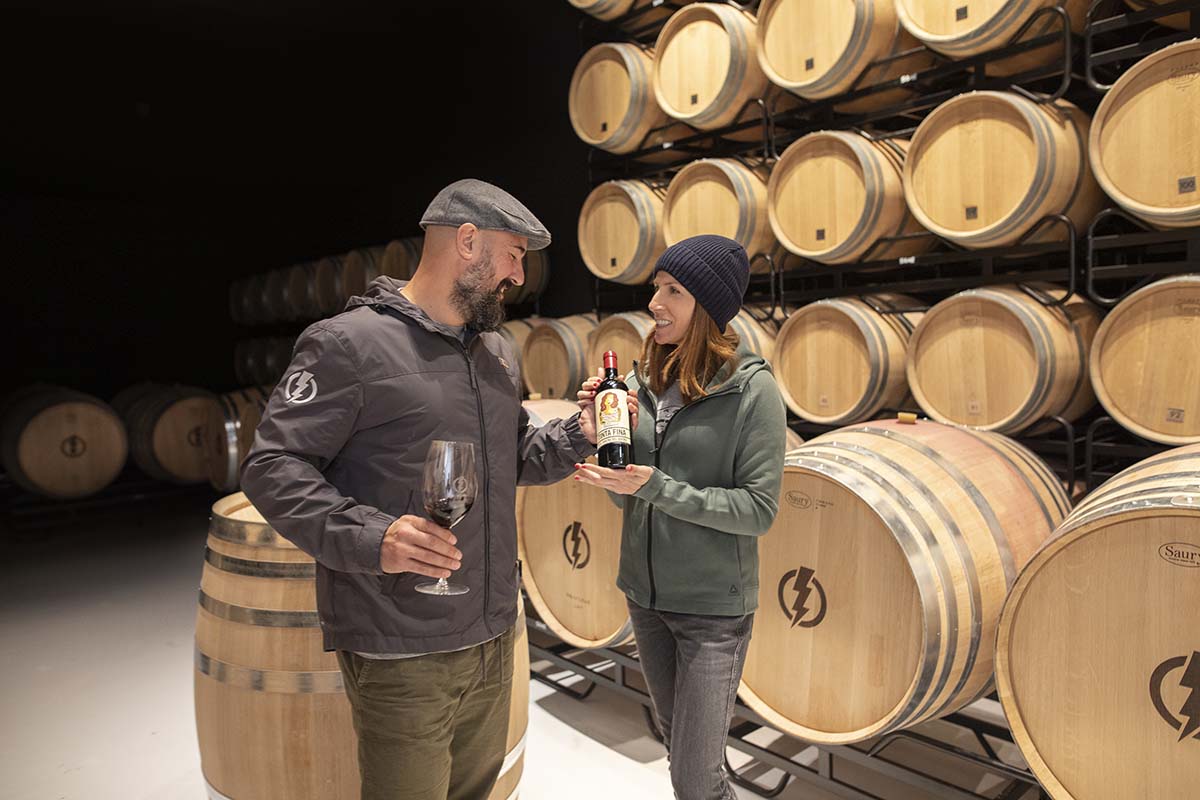Some booths at Vinexpo whisper refinement; others shout with style. Casa Rojo did both -with giant bottles, lobster-printed boxes, and a map of Spain proudly outlining their regional roots. But what caught my eye first was a modest display: “Best Syrah from Spain – Gold Medal 2024, Gold Medal 2025.”
That Syrah wasn’t just decorated, it was distinctive. I had the chance to taste it that afternoon, and like the booth itself, the wine was bold yet elegant, layered with character and story. Casa Rojo’s founders, José Luis Gómez and Laura Muñoz, wore their illustrated branding proudly, their T-shirts echoing the iconic characters found on their labels – playful yet premium, modern yet rooted.
Before our conversation began, Laura shared a detail that captured their deep connection to Japan, where she and José Luis first met nearly twenty years ago. Their Syrah comes from a single vineyard named Minami – the Japanese word for south, referencing not only their home in Murcia but symbolizing how they started from the bottom and worked their way up. “It’s where everything began,” she said. The vineyard’s name is both a point on the map and a metaphor for their journey: from humble beginnings to global recognition.
As José Luis and I spoke, he traced the path of that journey – of a grape brought from France by his grandfather, of preserving terroir through care and intention, and of a philosophy rooted in joy, memory, and respect. And in a twist of serendipity, we discovered shared friends in the Philippines, where he had once done business yet another reminder of how connected the world can be when stories are passed, and wines are shared.
This Postmarked by Bridges feature explores how Casa Rojo isn’t just crafting great wines—they’re building bridges, with roots in Spain, a heart in Japan, and ties that stretch across continents.
Bridges: Spanish wines are often celebrated for their bold reds and deep heritage. Beyond the well-known regions and varietals, what do you think the world still underappreciates about Spanish wine?


José Luis Gómez: The answer is really in the question. Beyond the famous regions, there are so many hidden corners in Spain that produce incredible wines. Every part of the country makes wine – with different climates, elevations, and local grape varieties. You have to remember that before the French wine tradition took hold, it was Spain that first received the influence of the Phoenicians, the Greeks, and the Romans. Wine culture began here in the Mediterranean, and then traveled north.
In Spain, we traditionally made wine for ourselves – for family, for friends not for export like the French. That’s why French wines became more globally recognized. But if you dig deeper into Spain, especially outside the big denominated regions, you’ll find extraordinary wines in small, often overlooked places.
Your Syrah has just been named the best in Spain two years in a row. What do you think sets it apart in terms of character and craftsmanship?
Not just the Syrah but all of our wines are rooted in a philosophy. From the start at Casa Rojo, we wanted every bottle to tell a story. When someone opens one of our wines, we want them to close their eyes and feel transported to our region in southern Spain, to the rosemary-filled mountains, the pine trees, the wildlife.
When someone opens one of our wines, we want them to close their eyes and feel transported to our region in southern Spain, to the rosemary-filled mountains, the pine trees, the wildlife.
José Luis Gómez, Co-founder of Casa Rojo

For our Syrah, we treat the grapes with the utmost care. No oxidation, gentle handling, immediate fermentation. Our aim is to capture the aroma and energy of the land in the bottle. The result is a wine that reflects who we are and where we live.
Why do you think this Syrah stood out to the judges?
Syrah is a very international grape. You find it in France, Australia, California, Chile. It adapts well. But the beauty is that it expresses itself differently depending on where it grows.
Our Syrah is unique because it’s rare to find Syrah in southern Spain. The story is personal. My grandfather emigrated to France and worked in a winery near Lyon. He brought some Syrah vines back with him and planted them in Murcia. So we’ve had this grape for decades in our family.
What the judges likely recognized was its singularity. Our Syrah doesn’t taste like the others. It’s bold, but it’s also rooted in a very specific terroir and that gives it a character all its own.
The branding really stood out to me – playful, elegant, and unmistakable. What do you hope people feel when they see one of your bottles?


Joy, respect, attraction and recognition.
If you want to go premium, you have to go all in not just with the wine, but with everything: the bottle, the label, the feel. We use cotton paper for the labels – expensive, but beautiful. Each one features a character that’s meant to be remembered.
You might forget a name, but you’ll remember the wine with the lobster, or the opera singer, or the surrealist. Next time you see it in a restaurant, you’ll say, “Ah, I know this one!” That’s the power of emotional branding.
Before we began, Laura mentioned that your Syrah comes from a single vineyard called Minami – the Japanese word for south. Tell me more about that.
Yes – Minami. It’s a tribute, really. That vineyard sits in the south of Murcia, but we named it in Japanese because Japan is where everything began for us—as a couple, as a business.
We met in Tokyo almost twenty years ago. I was presenting wines at Hotel New Otani in Akasaka-Mitsuke; Laura was introducing her family’s jamón products. I joked, “Red wine and ham perfect match. We should work together.” (laughs) And we’ve been together ever since.
So Minami means more than geography it’s a metaphor. We started from the south, from the bottom, and slowly built something meaningful. That Syrah is the result of everything we’ve learned along the way.
That’s incredible. One last question – what has Japan taught you, not just personally, but in terms of how you run your business?
Everything. The respect, the discipline, the long-term mentality those values shaped our approach from the beginning.
Japan is very close to our hearts. We love the culture, the food, the way relationships are built. It’s where we found our first customers, our first validation. And even now, every time we return – to Shimbashi, to Shibuya, to our friends in Tokyo, it still feels like coming home.







